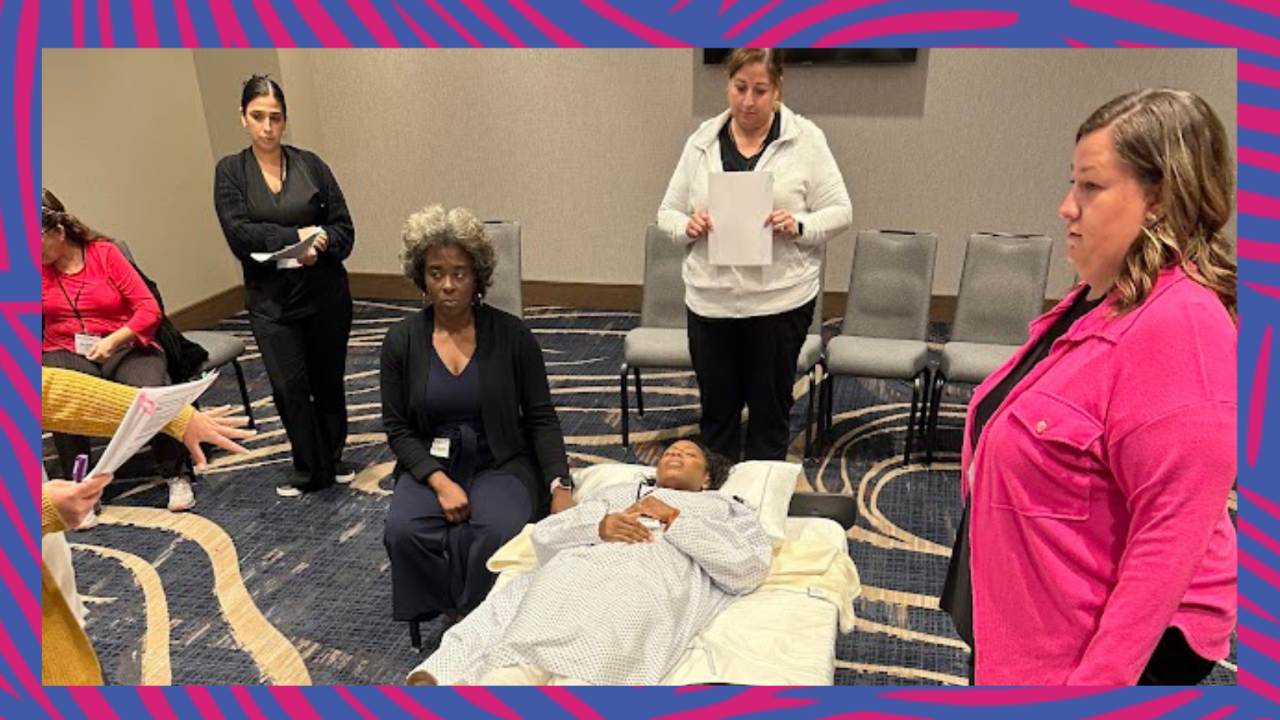
Co-Creating Trauma-Informed, Patient-Centered Care Simulations
Jun 16, 2025How patients are helping prevent trauma
When someone experiences a severe maternal health event, it often becomes a defining — and sometimes devastating — moment in their life. But for the medical teams involved, it may also be one of the first times they’ve encountered such a high-stakes emergency.
That’s not how it should be.
Providers need the opportunity to learn and practice responding to critical situations — not in real time with real lives on the line, but in safe, structured environments that prioritize both technical skills and emotional intelligence.
That’s where simulation training comes in. And now, MoMMAs Voices is redefining what that training looks like — by placing real patients with real lived experience at the center of it.
From Lived Experience to Lived Impact
In traditional medical simulations, mannequins stand in for patients. Emotions, nuance, and humanity are imagined — often missing critical insights that only someone who’s been there can offer.
What if we could do better? What if real patients could help prevent trauma, not just survive it?
That vision became reality when MoMMAs Voices partnered with the District of Columbia Hospital Association (DCHA) and the DC Perinatal Quality Collaborative (DCPQC) to create a new kind of training. One where patients are co-creators, helping shape how providers learn, practice, and grow.
"When we began to develop our concept on a simulation that includes trauma-informed and preventive care as a main component, we naturally thought of MoMMAs Voices as a collaborator to assist us in incorporating the patient voice throughout the process, said Gayle Michelle Olano Hurt, MPA, CPHQ, PMC, Vice President of Patient Safety & Quality Operations.
Since 2018, MoMMAs Voices has been leading patient-centered conversations across the country — listening to hundreds of families share what they lived through and what they wish had gone differently. By the 2022 National AIM Conference where this discussion took place, one question had become urgent and unavoidable: How do we stop trauma from happening in the first place?
Beyond the clipboard: elevating the role of patients in simulations
Real moments with patient family partners shaped how the team thought about integration.
“I saw a simulation where a patient partner was in the room — and completely overlooked,” recalled MoMMAs Voices Program Director Nicole Purnell. “It was a powerful moment. I realized patients could offer so much more than just checking a box. Their feedback could shape how simulations were created, run, and debriefed.”
From that insight, a new tool was born as part of the larger simulation toolkit: the Patient Observer Feedback Form, co-created with patient partners to reflect what truly matters to them during care — like consent, communication, and respect. More than a checklist, it became a lens that shifted the entire focus of training.
Program Manager Jennifer Mikenas and Program Assistant Anna Scott joined Nicole in this work, supporting the entire evolution of the simulation project — from initial design to real-time adjustments based on patient insights. Early on, their focus was on matching patient family partners with simulation opportunities and ensuring they were prepared — logistically and emotionally — for what they’d encounter.
But as the simulations progressed, Jennifer and Anna stepped into co-development roles, helping refine and adapt the process to ensure patients weren’t just present — they were truly seen, protected, and empowered.
What we believe are best practices — learned directly from patient family partners — include:
- Ensuring patient partners have choices in how they participate — acting, observing, or advising.
- Providing emotional support and clear preparation before simulations.
- Using checklists and structured tools to guide feedback and elevate the patient voice.
- Building in time for reflection and iteration after each simulation.
- Creating a culture of safety and respect where patients can share insights freely and without pressure.
These lessons didn’t come from textbooks — they came from the lived experiences of patients themselves. And that’s what makes them so powerful.
Multiple roles, one purpose: empowering choice
One of the most trauma-informed decisions the team made was this: not every patient has to participate in the same way.
- Some chose to act in the simulations, embodying emotions and reactions drawn from their lived experiences.
- Others preferred to observe, offering clear, grounded feedback as simulations unfolded.
- Still others took on roles behind the scenes, helping to plan and advise so they could shape the structure without having to relive their trauma directly. In her role as program director and as a partner with her own lived experience, Nicole worked closely with the DCHA team. She made sure that what patients shared was truly woven into the entire project — not just in the moment, but in the way the work continues to grow and evolve.
This flexibility wasn’t just accommodating — it was vital. Trauma-informed care means honoring where each person is and recognizing that healing and advocacy look different for everyone.
By offering a spectrum of involvement, the project created safe, meaningful ways for patients to participate — and for systems to grow more compassionate because of it.
Learning out loud: iteration as innovation
The team didn’t expect to get everything right from the start. Instead, they built in space to reflect, adjust, and evolve.
After each simulation, patient feedback — both written and spoken — revealed what worked and what needed to shift. The team learned to balance raw emotion with structured learning, to share sensitive insights through skilled facilitators, and to create “buddy systems” so patients had support in the room when moments got heavy.
These weren’t just logistical details. They were acts of care.
Lessons that reach beyond the simulation lab
By the end of the pilot, a powerful picture had emerged:
- Patients can do more than tell stories — they can transform systems and ways of thinking.
- Trauma-informed training isn’t just possible — it’s essential to learn the right lessons.
- Healthcare teams learn better when they learn with patients, not about them.
Some takeaways that continue to guide this work:
- Bring in multiple patient perspectives for depth and balance.
- Know who’s in the room — relationships and past experiences matter.
- Create emotional safety through preparation and trusted support.
- Stay nimble — every simulation is a chance to grow.
- Let patients lead in the ways that feel right for them.
Why this matters: And why its just the beginning
The partnership with DCHA & DCPQC wasn’t just about improving simulation training. It was about changing culture.
It showed that with the right support, patients can be powerful educators, helping teams learn not just clinical protocols but how to lead with empathy, presence, and humanity.
For funders and partners wondering what MoMMAs Voices is capable of — this is the answer: We don’t just train storytellers. We develop co-leaders. System-shapers. Trauma-preventers.
This pilot proved what’s possible when patients are seen not as guests in the room, but as guides. And it’s only the beginning. This pilot showed what’s possible when patients are treated not as bystanders, but as essential partners.
We’re continuing to refine and share the Patient Observer Checklist; a practical tool created with patient voices at its center. We’re also working on new ways to bring these lessons into training and care settings everywhere.
If you’re working on a project that could benefit from patient-led co-design, or if you’re interested in learning more about the Observer Checklist, we’d love to connect.
Please reach out to us at MoMMAs Voices. Let’s build the future of care together — and make sure that patients are always at the heart of it.
Photo courtesy of our partnership with the Texas AIM program, where patient family partners participated in live simulation training on a hypertensive obstetric emergency in November 2023.
Don't miss a beat!
New moves, motivation, and classes delivered to your inbox.
We hate SPAM. We will never sell your information, for any reason.
